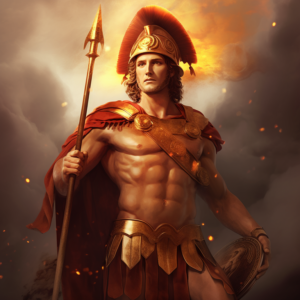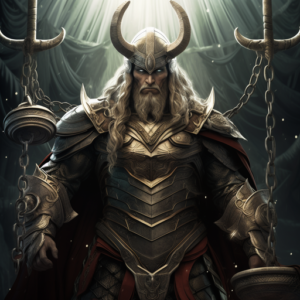Forseti is primarily known as the god of justice and fairness. His name is derived from the Old Norse word “forseti,” which means “president” or “chairman.” He is often depicted as a wise and impartial judge who settles disputes and promotes harmony.
Appearance
As a lesser-known figure in the mythology, there are limited artistic representations or descriptions of Forseti’s appearance.
Family
Forseti is often identified as the son of Baldr, the god of light and purity, and Nanna, a goddess associated with peace and fidelity. In some versions of Norse mythology, Forseti’s lineage can be traced further back. He is said to be the grandson of Odin, the chief of the Aesir gods, and Frigg, Odin’s wife and queen of the Aesir.
Symbols
Forseti is a lesser-known Norse deity, he is associated with several symbols that represent his role as a god of justice and peacemaking. These symbols capture the essence of his attributes and the significance of his role within the mythology. Here are some symbols associated with Forseti:
The scales of justice are a common symbol associated with Forseti. These scales represent his role as a fair and impartial judge who carefully weighs evidence and considerations before making judgments. Forseti is sometimes depicted wearing white robes or attire, which symbolize purity, fairness, and his role in upholding justice without bias.
Powers & Duties
Forseti, the Norse god of justice and peacemaking, possesses powers and abilities that are closely tied to his role in maintaining fairness, order, and harmony. While Norse mythology doesn’t provide an exhaustive list of his powers, here are some key aspects of Forseti’s abilities:
Forseti excels at mediating disputes and conflicts among gods and humans. His power lies in his ability to carefully listen to all sides, consider the evidence, and make judgments that are perceived as fair and just. Forseti’s judgments are known for their impartiality and lack of bias. His decisions are based on an objective assessment of the situation and the principles of justice.
Forseti’s presence and influence contribute to maintaining peace and preventing violence. His reputation as a peacemaker helps to discourage acts of aggression and conflict within the Norse cosmos. Forseti’s wisdom and insight make him a source of valuable advice and guidance for those seeking solutions to complex problems. His ability to see through deception and get to the heart of matters makes him a respected figure.
In some interpretations, Forseti is attributed with creating the first laws that govern Norse society.
Forseti’s role in maintaining harmony involves balancing opposing forces and ensuring that equilibrium is maintained within the realms of gods and humans.
Worship
Worship of Forseti, as a lesser-known Norse deity, is not extensively documented in historical sources. However, modern practitioners of Norse Heathenry and Ásatrú have taken an interest in honoring Forseti for his role as a god of justice and peacemaking. While specific worship practices may vary among individuals and groups, here are some ways in which Forseti might be honored:
Blót, the ritualistic offering of food, drink, and sometimes symbolic items, was a central aspect of Norse worship. Offerings of food, particularly items associated with fairness and harmony, could be made to Forseti as a way of showing respect and seeking his blessings.
Individuals seeking guidance, wisdom, or assistance in resolving conflicts might offer prayers or invocations to Forseti. These prayers could be recited at personal altars or during communal gatherings.
Facts About Forseti
- Forseti’s role as a god of justice and mediation makes him one of the few Norse deities specifically associated with legal matters and conflict resolution.
- Forseti’s judgments are known for their impartiality and fairness. He is revered for his ability to make decisions that are not swayed by personal biases or allegiances.
- Forseti’s hall, called Glitnir (“shining” or “gleaming“), is described as a place of great beauty and peace. This hall is where he listens to disputes and makes rulings. Glitnir is said to have a golden balustrade that separates those in conflict, preventing them from acting violently within the hall.
- Forseti’s mediation abilities are evident in myths, such as his involvement in settling a dispute between Freyr and the giant Gymir in the “Lokasenna” poem.
- While Forseti’s historical worship details are limited, he has gained recognition and reverence among modern practitioners of Norse Heathenry and Ásatrú who honor him for his principles of justice and peacemaking.
- Forseti is considered a lesser-known deity in Norse mythology, but his significance in upholding principles of fairness and maintaining social order is nonetheless important.
*As an Amazon Associate I earn from qualifying purchases.






